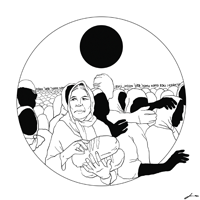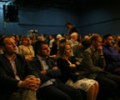Exhibition ArchiWar: Stories and Memories of the Srebrenica Genocide by Jelena Jaćimović

Exhibition ArchiWar: Stories and Memories of the Srebrenica Genocide by Jelena Jaćimović, organised in cooperation with the Humanitarian Law Center, will open in the Center for Cultural Decontamination on 28 September at 7PM.
The exhibition by Jelena Jaćimović represents a way of resisting the dominant memory politics in Serbia based on nationalism and militarism that encompasses the denial of war crimes and genocide committed by Serb forces, glorification of sentenced war criminals and army, and instrumentalisation of Serb victims.
The legacies of the 1990s wars are still present in post-Yugoslav societies. In the early 2000s, the post-Yugoslav countries seemed to have at least formally committed to transitional justice. However, two decades after the end of the armed conflicts, the chances for transitional justice and reconciliations are even slimmer.
Additionally, the dissolution of Yugoslavia involved fragmentation of its culture of remembrance along the ethnic lines and led to today’s deeply divided and incompatible memory cultures in the post-Yugoslav space. Politicians, media and public discourses across the region openly promote a revisionist and nationalist discourse that glorifies own nation and criminalises the others. The result of this tendency is a lack of awareness among society at large about the systematic human rights violations during the wars and about the manipulated and selective nature of the dominant narratives. The denial of the Srebrenica genocide in Serbia is the most prominent example of this revisionism.
The inspiration for the author was the story of Amra Begić Fazlić, a woman who survived the genocide in Srebrenica and who currently works in Memorial Center Potočari, whose father and grandfather were killed in July 1995. Her story about a dream in which she is searching for her father’s bones, about baby Fatima, her best friend, neighbours, family, getting used to death, about her father and Srebrenica is one of many personal experiences that must be heard and must never be forgotten.
The exhibition is a display of personal stories through the author’s archival analysis of court records, video materials, photographs, as well as the stories still documented by the Memorial Center Srebrenica and many media. The goal is to share the stories and experiences of the victims, survivors and their families through illustrations that do not deal with perpetrators and those guilty.
The website archiwar.com is an opportunity for the wider public to look at the artwork, read stories about it and contribute to raising awareness through different forms of creativity that would be posted on the webpage beyond the exhibition. This is also an invitation for artists, individuals and groups who want to create something similar themselves and continue there
where ArchiWar project started. The plan is for the platform to grow into a sustainable medium that will present different content related to the 1990s wars in digital and interactive ways and provide people with the space for action.
The exhibition was created with the support of the Special Focus programme by Reconstruction Women’s Fund. The exhibition will be available from 28 September to 4 October.
Follow the news about exhibition on Facebook event








